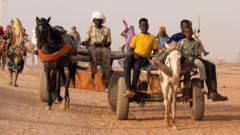In a landmark case at the International Court of Justice (ICJ), Sudan has accused the United Arab Emirates (UAE) of being "complicit in genocide" linked to its two-year civil war, which has resulted in a humanitarian crisis affecting millions. Sudan's military administration claims that the UAE has been supplying arms and support to the paramilitary Rapid Support Forces (RSF), reportedly targeting the non-Arab Masalit ethnic group in West Darfur.
As the devastating conflict between Sudan's army and the RSF continues, the toll has escalated to tens of thousands dead, with over 12 million people displaced. Sudan's allegations point to systematic assaults by the RSF on non-Arab communities, accompanied by horrific acts like the use of rape against civilians. The United States has echoed these charges, sanctioning RSF leader Mohamed Hamdan Dagalo, known as Hemedti, while the RSF denies targeting civilians intentionally.
While the Sudanese military government cannot directly take the RSF to court, it has positioned its claims against the UAE, asserting that military and political backing from the Emirati government has enabled these genocidal actions. Sudan seeks reparations and intervention to prevent further atrocities, urging the ICJ to enforce measures against the UAE's arms supply to the RSF.
However, the UAE has dismissed the accusations as a disingenuous maneuver, calling for the immediate dismissal of the case. The UAE maintains it does not support the RSF and criticizes Sudan's approach as a deflection of its own culpability in the conflict.
Legal analysts express skepticism about the case advancing significantly, pointing out the UAE's reservation to the Genocide Convention, which may limit the ICJ's ability to pursue the allegations. Despite these challenges, Sudan's move to bring the UAE's alleged role in the devastation to the forefront marks a critical moment in the discourse on accountability in the face of war crimes.
In the coming weeks, the ICJ will reveal whether it acknowledges its jurisdiction to consider Sudan's appeal for urgent protective measures, although the court's rulings, while binding, lack enforcement capabilities. As the world watches, the plight of the Masalit community hangs in the balance amidst ongoing brutality and struggles for rights and recognition in the war-torn nation.
As the devastating conflict between Sudan's army and the RSF continues, the toll has escalated to tens of thousands dead, with over 12 million people displaced. Sudan's allegations point to systematic assaults by the RSF on non-Arab communities, accompanied by horrific acts like the use of rape against civilians. The United States has echoed these charges, sanctioning RSF leader Mohamed Hamdan Dagalo, known as Hemedti, while the RSF denies targeting civilians intentionally.
While the Sudanese military government cannot directly take the RSF to court, it has positioned its claims against the UAE, asserting that military and political backing from the Emirati government has enabled these genocidal actions. Sudan seeks reparations and intervention to prevent further atrocities, urging the ICJ to enforce measures against the UAE's arms supply to the RSF.
However, the UAE has dismissed the accusations as a disingenuous maneuver, calling for the immediate dismissal of the case. The UAE maintains it does not support the RSF and criticizes Sudan's approach as a deflection of its own culpability in the conflict.
Legal analysts express skepticism about the case advancing significantly, pointing out the UAE's reservation to the Genocide Convention, which may limit the ICJ's ability to pursue the allegations. Despite these challenges, Sudan's move to bring the UAE's alleged role in the devastation to the forefront marks a critical moment in the discourse on accountability in the face of war crimes.
In the coming weeks, the ICJ will reveal whether it acknowledges its jurisdiction to consider Sudan's appeal for urgent protective measures, although the court's rulings, while binding, lack enforcement capabilities. As the world watches, the plight of the Masalit community hangs in the balance amidst ongoing brutality and struggles for rights and recognition in the war-torn nation.

















